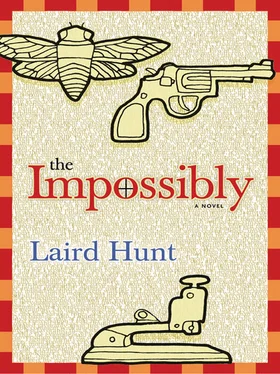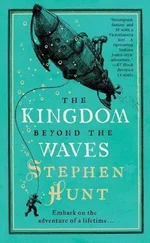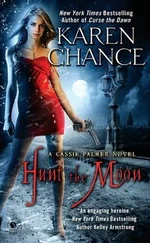I sighed. I took a sip. As I pulled the glass away from my lips, a woman came out of the kitchen with her own glass and sat down beside me.
Now it came back to me. I had been on my way to work and, in light of the seriousness of the case I was now working on, had stopped off at home to retrieve my gun. Arriving at my door, I had met this woman, who, she had told me, had attempted to see me earlier that evening at my office and had been turned away.
I’m sorry, I said.
You’ve already apologized, it’s all right, she said, sipping at her drink.
She, too, was quite an interesting aggregate. By that I mean that she was in possession of attributes both comely and less so, some of them simultaneously. Take for instance her legs. They were exquisitely shaped, but exceptionally short, as if she had on the legs of a much smaller person. Her hands, too, which looked as though they’d been chiseled out of brown granite, were tiny, so that she was obliged to hold her glass of scotch, rocks no water, with both of them. Her face, for its part, was gorgeous, and it was a little hard not to just stare at it, and stare at it and stare.
I’m sorry, I said. I mean for staring.
How do you like the whiskey? she said.
Lovely, I said.
She had poured it from a leather-wrapped stainless steel flask that she had taken from an inside pocket. When she had pulled it out, I had seen her shoulder holster and the small but deadly looking automatic it held.
How do you do with that thing? I had asked.
Marvelously, she had said.
At that point, I had excused myself to the bedroom where I had retrieved my own gun, a revolver, not too accurate but persuasive, had slipped it into my pocket, then returned to the living room and sat down.
I took another sip.
The apartment seemed a little cool to me.
I asked her if she would like me to turn up the heat.
She told me that she was adequately heated.
It seems cool to me, I said.
It’s probably your bruise.
Probably.
Take another drink.
I took one.
Helps, doesn’t it?
I told her it did.
For a while we sat there drinking.
Any particular reason you stopped by?
Yes.
We drank a while longer.
I found that most of my thoughts, though dull, had to do with her face.
The tiny hands, too, had their charm.
Sitting there, I had a vision of them — very quickly, even too quickly, sewing small items of clothing for dolls. Then I saw her fingers, wearing bonnets, walking together one fine morning along a country road.
One encounters curious physical attributes more often than one would imagine, I considered saying.
I also considered proposing to discuss my own.
For instance, I have a trick knee.
I am holding it and having it do its unpleasant trick now.
And considered doing so then.
I’m sorry I didn’t see you earlier at the office, would you like to look at my knee? I said.
I’ve seen it, she said.
Oh.
You probably don’t remember.
Of course I do.
It was some time ago.
I remember it very clearly.
That took care of me for a few minutes.
During those few minutes I rolled back my eyes and ransacked my brain.
I haven’t been feeling that well recently, I said, finally, having turned up nothing, absolutely nothing.
I know.
For instance, hah, hah, I don’t have a pulse. By that I mean I haven’t been able to find it recently.
She looked at me.
You don’t have a stethoscope do you? I said, laughing a little. A stethoscope would probably clear this up.
No, she said.
She continued to look at me. She lifted her glass and looked at it. Then she looked at my wrist then at my chest, I think, then somewhere over my shoulder, at a mirror, maybe, that hung there, then looked at her glass again, lifted it to her lips, drank, looked at me, at my eyes, my eyes are brown shot with green, like a mineral I forget the name of, I saw a sample once, in a dark hall in which only the mineral cases were lit, looked away, set down her glass, leaned back, crossed her small legs, and said, I don’t either, I mean have a pulse, or anyway not much of one.
That night at work I asked for some time off. The Chief Dispatcher, an agreeable older gentleman always in shirtsleeves and a blue fez, told me that would be fine as long as I worked my current shift. This seemed fair, so I went out into the hall and took a look at the assignment board. I found my name next to that of my fleshy colleague — I’ll call him John — who I subsequently found in the copy room having drinks with another of our colleagues. This transactionist, John told me as we went out the door and onto the street, possessed a bosom he deeply admired.
Yeah? I said.
Very, very special, John said.
That’s interesting, I said.
Yes, it is, John said.
I thought about this as we walked along the street toward our destination, a disused power station that was soon, our briefing note told us, to be converted into a live/work space. Which is not to say that I spent an inordinate amount of time thinking about our colleague’s bosom, although I was happy enough, without having had the pleasure, to be supportive of John’s position on it. Rather, I thought of John’s choice of words, deeply admire, which made me think about my first client’s attributes and my recent visitor’s face and hands, then the lamentable state of my pulse, not to mention the revelations thereon my recent visitor had shared with me and the hallucinations of a sort that had both preceded and followed that interaction, all in the context of the case I was now working on, so that when for perhaps the tenth time since leaving my apartment I probed my wrist for some positive indication and found it, even if it was only very faint, very far off, very feathery ….
There is one, or almost one, she had told me and had helped me to find and count it — eighty-five faint beats that would grow fainter, as I grew fainter, she had said.
… I thought of deeply admired bosoms, and of, strangely, being bludgeoned to death, even if only, and I said this last aloud, hypothetically.
You’re a weird fuck lately, Sport, said John.
Then we arrived at the disused power station.
This was quite an impressive facility, with enormous brick walls and high windows and the words, carved in capital letters above the orange door, ELECTRICITY IS LIFE. We knocked and after a moment were let in. Inside it was dark, and the curious agglomeration of derelict machinery, tools, ladders, and sawhorses, lit only, as they were, by the streetlights filtering in through a few high, small windows, put us in a philosophical frame of mind.
John told me afterwards, as we walked toward the river carrying the heavy bag between us, that the spectacle had made him think of a book he had read recently on the phenomenon of decay, many of the illustrations for which had been taken from this city’s archives. Quite a number of the book’s pages were devoted to microscopic decay and the corruption of molecules. There is nothing that does not decay, said John, from the steel in the skyscrapers, to the flesh that wraps and hides us, to the light that bathes and burns our faces. Even ideas decompose, and the gods we once carried inside us have broken down into simpler products, many of which have, themselves, entirely wasted away.
For my part, having left aside for a moment the bosoms and bludgeonings I had been preoccupied with, as soon as we began to walk through the rows of ancient transformers, I thought of travel in deep space, and of a newly described propulsion system in which a spacecraft would generate a plasma field that would effectively function as a sail to harness the cosmic winds. It seemed to me that the majestically derelict machinery surrounding us, including the gutted turbine where the body was, must once have had something in common with the proposed plasma generator, which might someday lead us to strange and distant parts. It was along these and tangential lines (and not of decay) that I thought as we lifted the body wrapped in black plastic and deposited it in the oversize bag we had brought with us.
Читать дальше










![Беар Гриллс - The Hunt [=The Devil's Sanctuary]](/books/428447/bear-grills-the-hunt-the-devil-s-sanctuary-thumb.webp)

